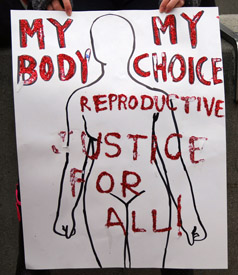Language matters, so let’s be clear: Women’s reproductive health is not a “social issue.”
Deciding whether to carry the red purse or the black bag to dinner Saturday night? That’s a social issue. Wondering why your child wasn’t invited to her classmate’s birthday party? That, too, is a social issue.
Attempting to limit women’s access to legal and safe abortions? Not even remotely a social issue, so let’s stop calling it that as we debate the Stupak-Pitts amendment, which is the latest effort in Congress to prohibit insurance coverage for abortion. The sooner we reject this dismissive casting of a woman’s essential right the sooner elected officials will understand it’s not theirs for the tinkering.
Politicians fond of limiting women’s reproductive rights often say they personally oppose abortion. They cite their religion, as if this carves out an exception in that whole separation-of-church-and-state thing so they can use their faith to restrict the rights of every woman in America.
In an interview with The Associated Press, Rep. Bart Stupak, D-Mich., made it clear that the United States Conference of Catholic Bishops played a leading role in getting his amendment into the House bill.
“The Catholic Church used their power — their clout, if you will — to influence this issue. They had to. It’s a basic teaching of the religion,” Stupak said.
My concern echoes that of Rep. Lynne Woolsey, D-Calif., who wrote in Politico: “The IRS is less restrictive about church involvement in efforts to influence legislation than it is about involvement in campaigns and elections. Given the political behavior of USCCB in this case, maybe it shouldn’t be.”
The IRS’ “Tax Guide for Churches and Religious Organizations” clearly states that tax-exempt organizations may not lobby:
“In general, no organization, including a church, may qualify for … (tax-exempt) status if a substantial part of its activities is attempting to influence legislation (commonly known as lobbying). An … organization may engage in some lobbying, but too much lobbying activity risks loss of tax-exempt status.”
If pressuring members of Congress and issuing public statements boasting about it don’t qualify as “too much lobbying,” then this columnist merely is dabbling in opinion writing and we should call it a hobby.
Back to this notion that elected officials need to feel personally comfortable with what a woman chooses to do with her body before they allow her to do it. This “me first, you never” approach to women’s rights reminds me of the man who stands outside a Planned Parenthood of Northeast Ohio’s health center in Bedford Heights and screams his pain at patients.
Three days a week, he shouts that 20 years ago, his pregnant girlfriend got an abortion and that he still sees that baby’s face every day.
“I see him every time he’s out there,” health center manager Molly Kirsch told me. “He’s very representative to me of what we hear from a lot of protestors. I feel sorry for him. He needs to reconcile his private pain about his life. In my experience, most women who make the decision to have an abortion heal, move on and lead productive lives.”
Some self-proclaimed progressives are reprimanding pro-choice women for insisting the Stupak-Pitts amendment must go. They accuse us of digging in on “our issue” — interesting how some insist they are pro-choice until it must actually mean something — at the risk of derailing health care reform for millions of Americans.
We did not initiate the Stupak stunt. And when it comes to health care, it always has been women who have borne the load. We are the primary caregivers for our children and our aging parents; we are most of the nation’s nurses, medical assistants and home health care workers; and we have raised billions of dollars for breast cancer research alone.
And yet here we are, immersed in yet another congressional debate over whether we should have affordable coverage for a medical condition that only women face.
Don’t tell us that women don’t care about health care.
But do tell us this: When has a medical procedure exclusive to men ever been held to a vote on a floor of the United States Congress?
Oh, wait, just remembered:
Never.
Press freedom is under attack
As Trump cracks down on political speech, independent media is increasingly necessary.
Truthout produces reporting you won’t see in the mainstream: journalism from the frontlines of global conflict, interviews with grassroots movement leaders, high-quality legal analysis and more.
Our work is possible thanks to reader support. Help Truthout catalyze change and social justice — make a tax-deductible monthly or one-time donation today.
